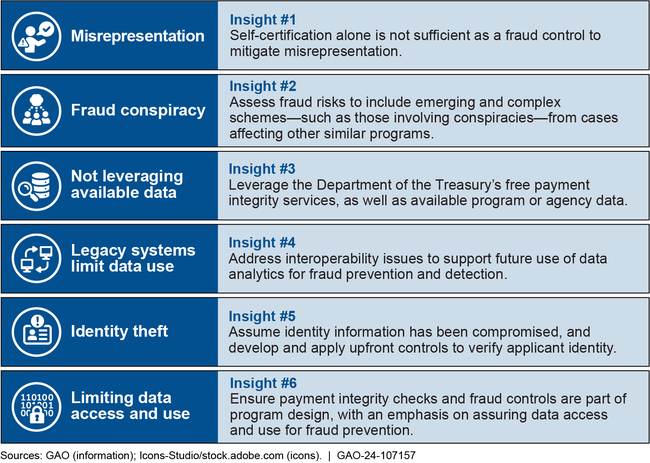COVID-19: Insights and Actions for Fraud Prevention
Fast Facts
Federal relief programs distributed funds quickly during the COVID-19 pandemic. While this was critical to assuring public health and economic stability, it also created unprecedented opportunities for fraud.
In this testimony, we discussed insights from our work on fraud in pandemic programs. When program managers understand the fraud schemes that emerged during the pandemic, they can figure out what went wrong and mitigate related risks.
We also highlighted our recommendations to agencies, matters for congressional action, and resources—such as our Fraud Risk Framework and Antifraud Resource—to better prevent fraud in federal programs.

Highlights
What GAO Found
Challenges that agencies faced in implementing COVID-19 relief programs provide insights into fraud prevention for normal operations and future emergencies. Specifically, understanding fraud schemes that emerged during the pandemic can provide opportunities for program managers to identify internal controls that had been circumvented and respond to mitigate the related risks. Data and system challenges, such as limited data sharing, highlight the value of data analytics for fraud prevention. Additionally, thoughtful program design choices that consider fraud vulnerabilities can facilitate fraud prevention.
Insights from COVID-19 Relief to Inform Fraud Prevention

With strategic fraud risk management, agencies are better positioned to manage fraud during normal operations and emergencies. Sources that provide additional insight for fraud prevention include recommendations GAO has made to agencies, actions GAO identified that Congress can take to strengthen fraud risk management practices across the government, and resources GAO developed to support strategic fraud risk management. Implementing these recommendations and taking these actions, along with leveraging available resources, can enable agencies to carry out their missions and better protect taxpayer dollars from fraud during normal operations and prepare them to face the next emergency.
An Insight Based on GAO Resources and Recommendations to Agencies and Congress

Why GAO Did This Study
Since March 2020, Congress and the administration have provided trillions of dollars in COVID-19 relief funding to help the nation respond to, and recover from, the pandemic. Agencies across the federal government acted quickly to stand up new programs and greatly scale up existing programs.
While COVID-19 relief programs were critical for assuring public health and economic stability, they also created unprecedented opportunities for fraud due to the dollars involved and other risk factors. While the full extent of fraud associated with the COVID-19 relief funds will never be known with certainty, estimates are in the hundreds of billions. In light of what was likely lost to fraud during the pandemic, the importance of fraud prevention cannot be stressed enough.
This testimony discusses (1) insights for prevention from COVID-19 fraud; and (2) recommendations, matters, and resources for improving fraud prevention in normal operations and future emergencies.
GAO reviewed its prior COVID-19 findings and recommendations on internal controls and fraud risk management practices.
Recommendations
As of August 2023, agencies needed to take additional action to fully address 95 GAO recommendations to help ensure they are effectively managing fraud risks. Additionally, in March 2022, GAO identified 10 actions Congress could take to strengthen internal controls and financial and fraud risk management practices across the government. All 10 remain open.
